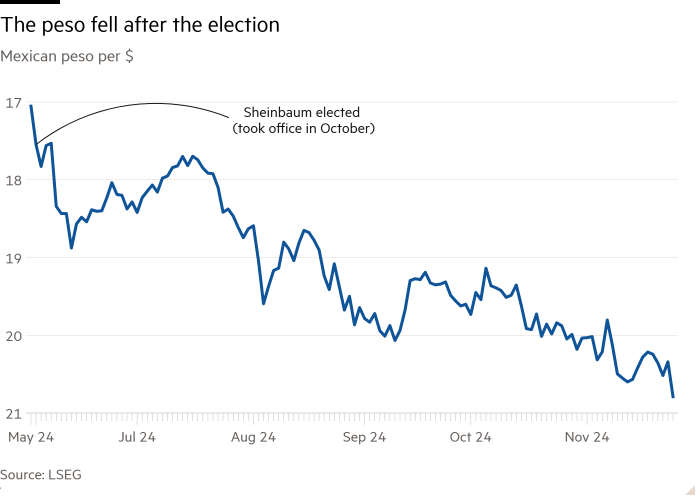Mexico’s new president digs in with radical ideas as Trump threat looms

Since she took over as Mexico’s president at the start of October, Claudia Sheinbaum has maintained one of the most symbolic innovations of her predecessor Andrés Manuel López Obrador — the mañanera, or morning news conference.
His version was long, and heavy on folksy charm. Hers is shorter and more direct. But Sheinbaum still refers to López Obrador, her political mentor, as “the best president of Mexico” and her rhetoric echoes his sense of constant political struggle against a deeply entrenched elite.
“Our adversaries, the court, the others, that really just protect privilege, believed that President López Obrador was going to leave and we were going to come in and we were going to retreat,” she said at a rally on Sunday.
“No, no one is chickening out, here we are going ahead with the transformation of public life in Mexico. We will never betray the people or our principles.”
The continuity with López Obrador is about more than just tone. Sheinbaum’s government is already shaping up to be a more sweeping version of that of her predecessor, widely known as “Amlo” in Mexico.

Indeed, Sheinbaum is doubling down on many of López Obrador’s more radical proposals just as Mexico is facing the potential turbulence of a new Trump administration and promised tariffs that could have a devastating impact on its economy.
Luis de la Calle, an economist and former trade negotiator, says the constitutional changes she is implementing are “systemic destruction” that “exports Amlo’s methodology . . . to the entire economy”.
On paper, Sheinbaum, who has a PhD in energy engineering that she studied for partly in the US, has a markedly different career trajectory to her longtime mentor, who was a life-long activist from a rural southern state.
Following her emphatic victory in June’s presidential election, Sheinbaum had raised the hopes of investors, analysts and even opposition politicians that the country would chart a new path.
But during her first weeks in office, she has thrown her weight behind a package of López Obrador’s most controversial ideas, branded “Plan C”. Her first year in office will be spent implementing elections for judges, dismantling regulators and cementing the dominance of state companies in the energy sector — ideas that have been widely criticised by opponents for both harming Mexico’s democracy and for damaging private investment.

Sheinbaum describes her task as building the “second floor” of López Obrador’s “fourth transformation” of Mexico, an undertaking she sees as equivalent to attaining independence from Spain or the revolution that began in 1910.
“Claudia Sheinbaum’s ambition for power is interpreted wrongly,” says Mauricio Merino, director of the Institute for Research on Accountability and Combatting Corruption at the University of Guadalajara, who briefly worked on Mexico City earthquake reconstruction efforts while she was mayor. “What she wants is to consolidate the fourth transformation. She is perfectly convinced of its virtues.
“I don’t think she’s doing it in bad faith, sincerely I believe she thinks that she’s doing the best for the country, that liberal democracy was elitist, conservative, that it damaged Mexico.”
But investors, who saw López Obrador’s most profound changes halted by congress or the courts and were encouraged by Sheinbaum’s pledges to attract more foreign investment, are now unnerved.
Since the election, the Mexican peso has lost 15 per cent of its value against the dollar, and the benchmark IPC stock index is down almost 10 per cent.
“The question is whether the rebuilding of credible institutions might take too long for the Sheinbaum government, in such a way that investments might be delayed for too long,” says de la Calle.

Such criticism had been growing even before the result of the US election, but Sheinbaum will now be pushing her plans in the face of intense economic and political pressure from Washington.
On Monday, Donald Trump said he would impose 25 per cent tariffs on Mexican imports from day one of his presidency, a move that would have a huge impact on the country’s economy. He has previously talked about taking military action against drug cartels and has promised a mass deportation of illegal migrants, many of whom are from Mexico.
“They will put Sheinbaum in a very uncomfortable position,” predicts political risk consultant Carlos Ramírez. “López Obrador was very transactional with Trump . . . [Sheinbaum] has thinner skin. It’ll be difficult to accept him sending drones and imposing tariffs.”
Sheinbaum regards the last three decades, during which Mexico transitioned to democracy and opened up to free trade, as a “very dark period” of corruption and widening inequality.
It was a political order that López Obrador shook up in 2018 with a populist message that he would improve the lives of poorer Mexicans with expanded social programmes and costly infrastructure projects.
Real wages rose and poverty fell during his presidency, even though economic growth over the six years was paltry. His concentration of power and government resources helped him wipe an out-of-touch opposition off much of the political map.

Parts of Mexico’s business establishment had enjoyed cosy relationships with successive governments and generally avoided making public criticisms. They continued that tradition under López Obrador. Many of the country’s largest companies were left alone and even prospered during his presidency.
Broad public satisfaction with the former president handed Sheinbaum and her Morena party an unexpected landslide and a supermajority in congress. Since taking office last month, she has proposed few and mostly minor policy initiatives of her own.
The daughter of two scientists in a family with connections to Mexico’s Communist party, Sheinbaum grew up in leftwing academic circles in the south of the capital and still lives in Tlalpan, a local district she ran for two years until 2017.
Her house in a leafy middle-class neighbourhood is just a block from López Obrador’s own home in the city on a road now known locally as the “presidents’ street” and seems representative of what her supporters want from her.
“We want her to continue the project . . . to keep combating corruption,” says Arnulfo Arellanez, a 54-year-old with a clothes repair shop in the capital who voted for her. “What she promised in her campaign is great, she just has to do it.”
What Mexico is getting is a set of radical proposals originally drawn up by López Obrador, which won the label “Plan C” after plans A and B were derailed by congress and the courts.
Many analysts assumed the ideas would never be enacted, but after Morena assembled a supermajority in congress and passed the plan to fire the country’s judges, neither is now an obstacle. The opposition and rights groups are alarmed that checks and balances on the government’s power are being systematically dismantled.
Mexico will be by far the biggest country to elect all its judges via popular vote, in a process Sheinbaum backed enthusiastically throughout the campaign, arguing that it would reduce corruption and make the distrusted judiciary more accountable.
“Together we are going to transform the judiciary, truly from the bottom, from the people of Mexico,” she said at a recent rally in Zacatecas. “What is democracy? The power of the people by the people and for the people.”
Despite warnings from the US government, business leaders and lawyers that it would damage judicial independence and democracy, Sheinbaum pressed ahead, even ignoring an order from a federal judge to pause. A last-ditch attempt to halt much of the reform was thwarted by a single justice’s vote in the Supreme Court.
Sabino Bastidas, a Mexican political analyst, says Sheinbaum has few political options other than to follow López Obrador’s plans. “It will be very difficult [for her] to do anything more than what López Obrador has already proposed . . . if she follows the script, she is powerful, if she breaks from the script, she will be weak.”

Local business leaders and foreign investors are still unsure about the new government, and forecasters predict growth of just 1.2 per cent in the economy next year.
Many investors point out that, despite the deep changes, Sheinbaum has been more open to listening to them and appointed a more technically qualified team. But most agree the rules for investing are not clear enough yet, with recent presentations on energy lacking detail.
One Mexican executive says he sees several different versions of Sheinbaum: the engaged communicator with positive messages in private meetings and the leftist nationalist in public rallies.
“It’s confusing because it’s not clear which is the real Claudia or what the next message she will give is.”
When Sheinbaum stepped off a commercial flight to Rio for the G20 meetings this month, she broke with her predecessor in an important way.
Over a few days, she met China’s Xi Jinping, outgoing US President Joe Biden, along with the leaders of Canada, France, South Korea and others, and gave two brief speeches on reforestation and UN reform.
López Obrador, by contrast, failed to attend a single global summit during his presidency. One embassy representative reports that many delegations were interested in meeting her and reconnecting with Latin America’s second-largest economy.
“It’s not a priority for her government, but I think she does understand very well that what happens in the world affects us and therefore Mexico has to be present and she has to make Mexico’s voice heard,” says Martha Bárcena, Mexico’s former ambassador to Washington. “That is different to López Obrador.”
But as in other areas, the more open signals have been accompanied with sharp setbacks in some of the country’s most important bilateral relationships.
Sheinbaum has continued a particular fixation of López Obrador’s with Spain for not apologising for the colonisation of Mexico in the 16th century. The King of Spain was not invited to her inauguration, causing a fracas with the leftwing government of one of Mexico’s largest foreign investors.
The biggest economic challenge is the all-important relationship with the US, which buys more than 80 per cent of Mexico’s exports and is its largest foreign investor.
Maintaining the US-Mexico-Canada Agreement is essential for the country’s economic growth, but relations with both Washington and Ottawa had deteriorated even before the election of Trump.
Despite having signed USMCA in 2020 and enjoyed a good relationship with fellow populist López Obrador, incoming president Donald Trump has said one of his first acts will be imposing a 25 per cent tariff on all goods from Mexico.
That would devastate the Mexican economy, which sends more than 80 per cent of its exports to its northern neighbour. The threat may be a negotiating ploy, as it was in his last term where broad trade barriers were averted at the last minute.
Trump’s pledge to deport undocumented migrants is also significant, given that remittances from Mexicans working in the US, legally or otherwise, are worth almost 4 per cent of the country’s GDP.
Sheinbaum has already given a hint at how she plans to handle Trump, on Tuesday threatening retaliatory tariffs and blaming US drug consumption for violence at home.

But Morena’s support for leftwing authoritarian regimes is unlikely to endear her to Marco Rubio, Trump’s Cuban-American pick for US secretary of state, particularly after she sent a shipment of oil as part of “humanitarian” aid to Cuba’s communist government within weeks of taking office.
Even usually friendly Canada is now openly threatening to cut Mexico out of USMCA because of growing concerns about Chinese investment there.
Bárcena, the former ambassador, says the Mexican government “isn’t reading the signals and changes” on the international stage. “They read everything according to internal politics and their ideology.”
Many of Sheinbaum’s supporters see a thinly veiled machismo behind the depiction of her as López Obrador’s puppet.
As Mexico’s first female president, she has been unusually outspoken in favour of women’s rights, mentioning the issue regularly in speeches.
“What does feminism mean? That women are seen as people, we aren’t less, we are the same, we don’t ask for more nor do we ask for less,” she said in a recent speech, paraphrasing US activist Angela Davis.
Amid speculation in Mexico’s media about what she may want to do differently to her mentor, one of the biggest obstacles to any changes will be her own party’s disparate factions.

Those who think she wants to pursue a tougher security policy or push renewable energy say it will depend on her ability to handle the party. “How does she make a mark of her own? She doesn’t necessarily always have the support internally to do what she wants to do,” says Lila Abed, director of the Mexico Institute at Washington’s Wilson Center.
Much of Morena’s leadership — in the party and congress — is seen as more loyal to its founder than to her, a profound risk as she faces a recall referendum three years into her six-year term.
In his final weeks in office, López Obrador announced that his son Andrés López Beltrán would take up a senior role in the party, charged with the difficult task of building up local party branches. Many regard the younger López as a candidate for the 2030 election.
Sheinbaum is also implementing harsh budget cuts next year as she tries to restore Mexico’s fiscal credibility. Areas that were meant to be priorities for her, from the environment to security and healthcare, all received double-digit markdowns in funding.
But spending was increased for social programmes and billions were assigned for López Obrador’s costly Maya Train project linking the tourist mecca of Cancún with Mayan archaeological sites.
The opposition National Action party (PAN) Senator Ricardo Anaya says Mexico has to recognise that Sheinbaum is now making decisions, not López Obrador. He warns that between a worsening security situation, the erosion of democracy and Trump’s threats, the coming years could be turbulent.
“We have to take what’s happening seriously, and we need to understand that we have a president and she is in charge of the regime,” he says.
“It would be a brutal error to not recognise the enormous risks Mexico is facing.”
#Mexicos #president #digs #radical #ideas #Trump #threat #looms







